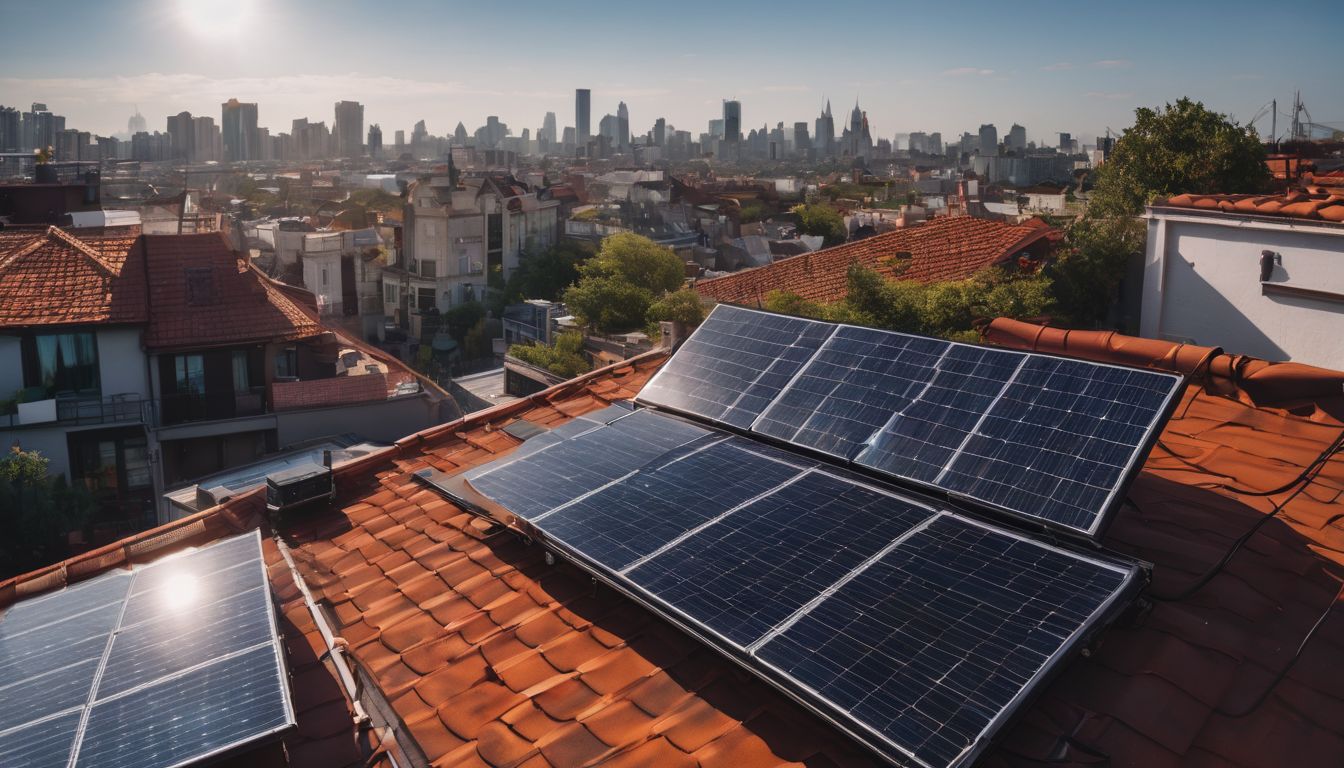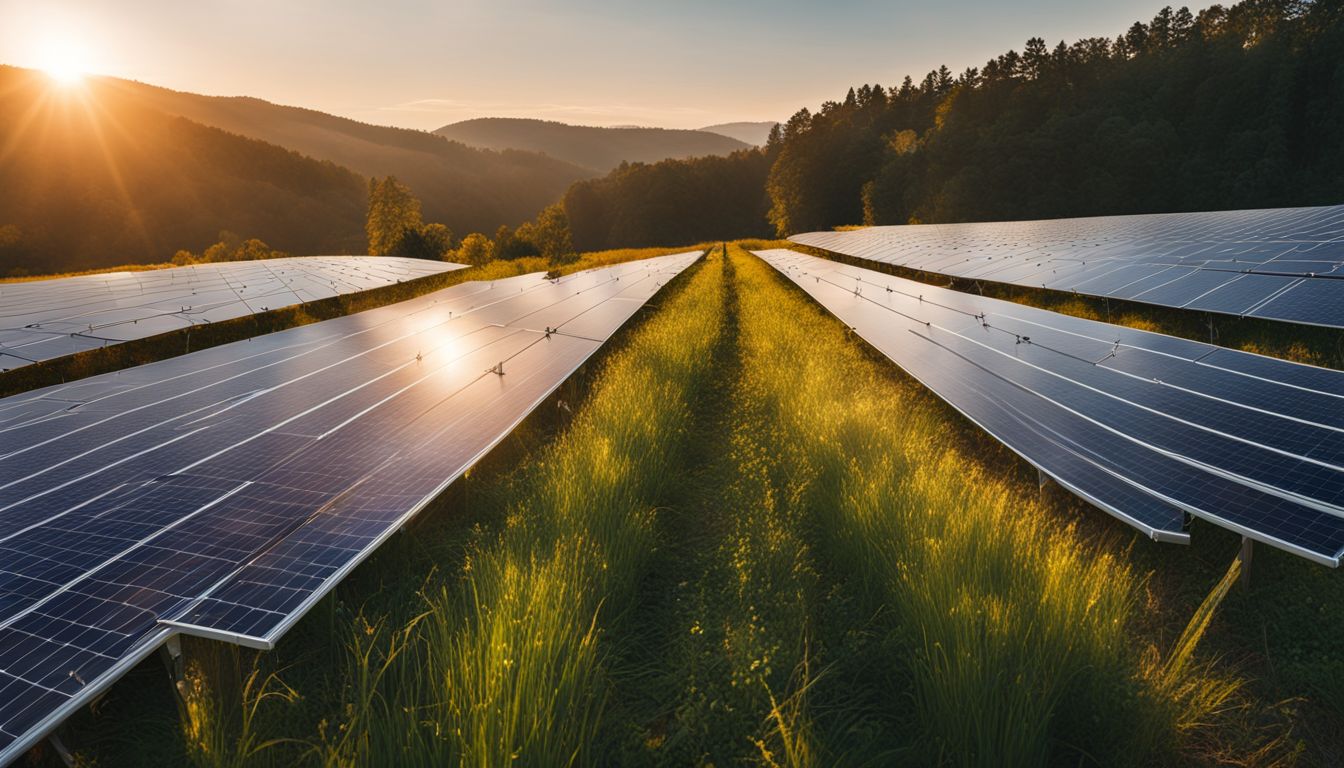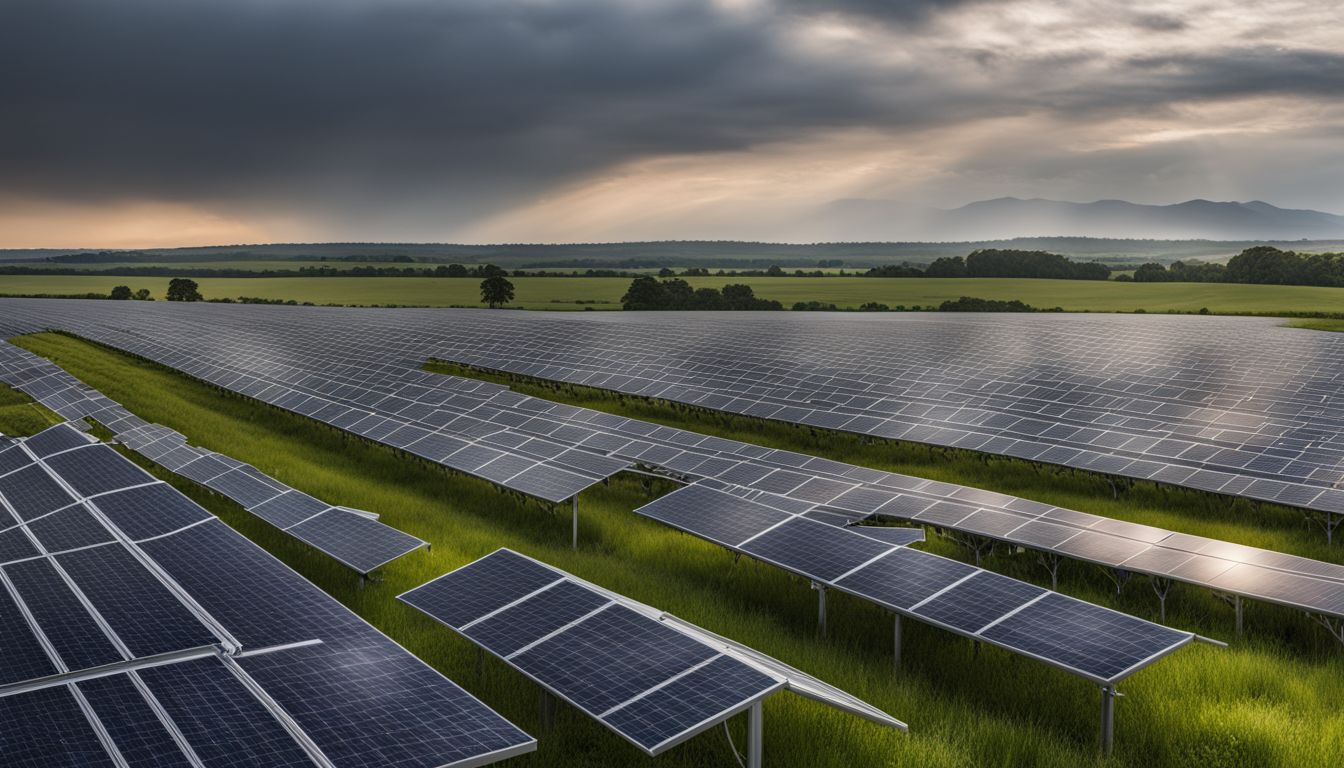Do you leave solar panels on all the time?

Many homeowners wonder if it's necessary to keep their solar panels running at all times. Solar energy systems have a generous lifespan of up to 30–40 years with proper care. In this blog post, we'll explore the impacts of leaving your solar panels constantly on and offer guidance for optimal use and maintenance.
Keep reading to harness the full potential of your solar investment!
Key Takeaways
- Solar panels can generate electricity even when it’s cloudy, but they produce less power than on sunny days. They can also produce a small amount of energy at night due to the temperature difference in the air.
- Keeping solar panels turned on all the time allows for continuous energy production and savings on your electricity bill. Switching them off for long periods of time might damage them or shorten their lifespan.
- Regular cleaning and maintenance, such as checking connections and ensuring no shading over the panels, are important to keep them working well. Covering them properly when not in use can protect them from bad weather or dirt.
- It's not safe to turn solar panels off by just unplugging them; there are specific steps you need to follow so that you don’t break anything or get hurt.
- In South Africa, an average home uses around 6 to 14 larger-sized solar panels, like 455W ones, for enough power. The number needed changes with how big your house is and how much energy you use during the day.
Understanding Solar Panels

Solar panels are devices that convert sunlight into electricity, using photovoltaic cells to harness the sun's energy. They work by allowing photons, or particles of light, to dislodge electrons from atoms within the solar cells, creating an electric current.
https://www.youtube.com/watch?v=Yxt72aDjFgY
What are solar panels?
Solar panels are clever devices that turn sunlight into electricity. They use something called the photovoltaic effect to make this happen. Each panel is made up of many solar cells that work together.
These cells capture light from the sun and change it into direct current (DC) energy. Then, other parts of a solar PV system, like an inverter, change this DC power into alternating current (AC).
That's the kind you can use in your home to run appliances and lights.
Panels don't need bright sunshine to work; they can still make electricity when it's cloudy or if the light is weak. This ability makes them a great source of energy, even when weather patterns vary.
Using them helps cut down on harmful carbon emissions since they're a renewable energy source. Plus, having them could mean paying less for your home's electricity bill because you're making some of your own power!
How do solar panels work?
Solar panels turn sunlight into electricity using something called the photovoltaic effect. Each panel is a big frame filled with lots of solar cells linked together. These cells are very special because they can grab energy from the sun and change it into a type of power called DC energy.
This DC power then needs to be changed so we can use it in our houses. A gadget called a solar inverter takes care of this. It converts the DC power into AC electricity, which is the kind you need for things like TVs, fridges, and lights.
The more panels you have hooked up together, the more electricity they make!
Do solar panels work in adverse weather?

Solar panels can still generate electricity in cloudy weather, although their efficiency may be reduced. They will not produce power at night, as they require sunlight to generate electricity.
https://www.youtube.com/watch?v=dXInOVXOvm4
Functioning in Cloudy Weather
Cloudy skies don't stop solar panels from doing their job. They still catch light, even when it's not bright or direct. On a day with lots of clouds, these panels can produce roughly half the power they do on sunny days.
Quality and efficiency play a role in how much electricity they can generate. Even with grey skies above, solar energy systems continue to provide power.
Rain or shine, photovoltaic panels keep working to turn light into electricity for homes and businesses. It's true that cloudy weather means less light gets through, but this doesn't mean everything stops.
Panels designed for efficiency cope better with dim conditions, ensuring that some energy will always be produced—even when the sun hides behind the clouds.
Performance during Night Time
Solar panels have a surprising ability to work after the sun goes down. They use the cool night air to make a small amount of electricity. This happens because there's still a temperature difference between the panels and the surrounding air, even at night.
Even though they can't make as much power as during the day, it's good news that your solar panels don't just turn off once it gets dark. They keep doing their job, trying to get you some energy whenever they can.
Should solar panels be left on all the time?
Continuous operation of solar panels can maximise the benefits of renewable energy production, while disconnecting them may have negative effects on their performance and battery life.
Understanding when to leave solar panels on or off is crucial for maintaining optimal functionality and efficiency.
https://www.youtube.com/watch?v=RMpd_TflEZI
Benefits of Continuous Operation
Keeping solar panels on all the time has many pluses. Your house gets power even when there's no electricity from the company that makes it. This means you can still have lights and your fridge running if there's a blackout.
The sun's energy is free, so catching it every day means you save money on bills.
Leaving them connected also cuts costs in the long run. You don't need to spend much on keeping them working well. With more sunlight turned into electricity, your home uses less from other sources that cost more and may harm our planet.
So, having panels always on is smart for both your wallet and the earth!
Effects of Disconnecting Solar Panels
Turning off solar panels isn't a good idea. Their lives get shorter if they sit without use and face harsh weather. Sunlight can harm them over time. Switching off for too long means they won't work as well later.
Unplugging from the grid needs to be done right to keep everything safe and prevent damage. It's like pulling out a plug at home; you need to do it carefully, or you could break something.
Maintenance of Solar Panels
Regular care requirements for solar panels include cleaning the surface to remove dirt and debris, as well as checking the connections and wiring for any signs of damage or wear. Precautions should also be taken during non-use periods to protect the panels from harsh weather conditions and potential damage.
Regular Care Requirements
Solar panels need care to work well. They turn sunlight into electricity, so keeping them clean is key.
- Wash your solar panels at least twice a year. Dirt and leaves can block sunlight from reaching the cells.
- Inspect for dust or bird droppings often, especially in places where these are common.
- Check that nothing shades your panels throughout the day. Trees or new buildings can stop light from hitting them right.
- Tighten any loose connections and make sure your mountings are strong. This keeps your panels safe during windy weather.
- Look over all cables and connectors; they should be in good shape with no wear or damage.
- Monitor the energy output to spot any sudden drops in performance, which might mean a problem.
- Keep an eye on the charge controller to ensure it's working as it should, protecting batteries from overcharging.
- Make sure your gel battery or lead acid battery has the right water level and isn't too old to work well.
- If you use a battery storage system, test it often to check its health and efficiency.
- Take time once every year to do a thorough clean-up of your solar setup for the best results.
Precautions for Non-Use Periods
- Keep the solar panels clean and free from debris such as leaves, bird droppings, and dust. Regular cleaning helps maintain the panel's performance.
- Ensure that the solar panels are not exposed to excessive heat or extreme cold temperatures for prolonged periods, as it can affect their functionality.
- Check for any signs of physical damage or wear and tear on the panels regularly, and address any issues promptly to prevent further damage.
- Cover the solar panels with a weatherproof material specifically designed for this purpose to protect them from adverse weather conditions or when not in use for an extended period.
- If you disconnect the solar panels during non-use periods, store them in a safe and secure location away from potential damage or theft.
- Inspect the wiring and connections to ensure they are intact and free from corrosion or damage caused by moisture or pests.
- Consider investing in a maintenance plan or professional inspection at regular intervals, especially if your system will be inactive for an extended period of time.
Safely Disconnecting a Solar Panel
When and Why to Disconnect: Knowing when to disconnect your solar panels is important to prevent damage during maintenance or adverse weather conditions. Steps to Disconnect Safely: Properly disconnecting a solar panel involves following specific steps to ensure the safety of both the equipment and the person performing the task.
When and Why to Disconnect
To disconnect solar panels, it's crucial to turn off the solar isolators on both the DC and AC sides first. This ensures safety during maintenance or non-use periods. When should you do this? Well, never connect or disconnect modules when they are energised by exposure to light or external power sources like a battery.
Also, avoiding disconnecting solar panels under load is important for safety reasons.
Why is this important? Disconnecting improperly can result in electrical hazards and damage equipment. By following these guidelines, one can ensure the safe operation and maintenance of their solar photovoltaic system while also prolonging its lifespan and performance.
Steps to Disconnect Safely
Safety is important when disconnecting solar panels. Here are the steps to do it safely:
- Use insulating gloves for protection.
- Turn off the solar disconnects on both the DC and AC sides.
- Switch off circuit breakers before disconnecting solar panels.
- Do not unplug solar panels, as the circuits are left open with nowhere for the power to go.
- Be cautious not to disconnect solar panels under load, as it can result in arcing and damage to the connector.
- Always ensure system integrity and safety when disconnecting and leaving solar panels disconnected.
Consequences of Leaving Solar Panels Disconnected
Leaving solar panels disconnected can have a negative impact on the overall performance of the photovoltaic system, as it might affect the battery life and energy storage capabilities.
It is important to understand the consequences of leaving solar panels disconnected to ensure optimal efficiency and longevity of the system.
Impact on the Solar Photovoltaic System
Leaving solar panels disconnected can have negative effects on the entire photovoltaic system. It can lead to a decrease in battery life and affect the performance of the system as a whole.
Covering solar panels with an opaque cloth before disconnecting them is a recommended precaution to avoid potential risks associated with connecting or disconnecting solar panels, particularly in larger arrays.
When cleaning the PV system, it's safest to turn off the entire system, especially for residential rooftop solar systems. Working on PV systems with covered panels reduces any potential risks associated with maintenance activities.
Consequences on Battery Life
Leaving solar panels disconnected for an extended period can harm the battery life. It's important to keep the panels connected, especially if they are wired to a battery bank. Disconnecting them for long intervals might lead to overcharging or undercharging, which can significantly reduce the battery's lifespan.
By staying connected and ensuring proper charging levels, you can help maintain the health and longevity of your solar panel system's batteries.
Remember that leaving solar panels disconnected can have adverse effects on battery life due to potential overcharging and undercharging. To safeguard against this, it is crucial to keep the panels connected when not in use and ensure they are properly maintaining charge levels.
Covering Solar Panels When Not in Use
Covering solar panels when not in use can help protect them from potential damage caused by environmental factors such as dust, bird droppings, or inclement weather. Properly covering solar panels can prolong their lifespan and maintain optimal performance when they are needed for power generation.
Reasons to Cover Solar Panels
Covering solar panels when not in use is essential to prevent potential energy overload and damage from extreme weather conditions. Exposure to excessive sunlight can lead to an overrun of energy production, which may adversely affect the efficiency and longevity of the solar panels.
By securely covering the solar panels during non-use periods, owners can safeguard their equipment from the negative impacts of prolonged exposure to harsh weather elements, thereby ensuring prolonged operational effectiveness and reliability for their renewable energy systems.
Moreover, by taking precautions such as covering solar panels when they are not in use, individuals contribute to extending the lifespan and maintaining optimal performance levels of their photovoltaic solar panel systems.
How to Properly Cover Solar Panels
To properly cover your solar panels when they are not in use, consider the following:
- Ensure that the covering material is reflective or non-translucent to block out sunlight and protect the panels from dust, debris, and bird droppings.
- Use a cover specifically designed for solar panels or a custom-fit tarpaulin to shield them from adverse weather conditions such as rain, snow, or hail.
- Secure the cover tightly to prevent it from flapping in the wind, potentially causing damage to the panels.
- Clean the panels before covering them to prevent any dirt or grime from becoming trapped between the cover and the surface of the panels.
- Periodically check the covers for any signs of wear and tear and replace them as needed to maintain optimal protection for your solar panels.
How many solar panels does it take to power a house in South Africa?
In South Africa, the number of solar panels needed to power a house varies. On average, a household in South Africa uses around 6 to 14 455W solar panels. Bigger homes might require up to approximately 23 panels for sufficient energy generation.
The quantity of solar panels required also depends on factors such as the home’s size and its typical energy consumption patterns throughout the day. Homes with larger energy needs may need more panels, ranging from about 25–26 if using 400W panels and more if there is lower daytime power usage.
Calculating how many solar panels are necessary can be done in eight simple steps, making it easy to determine the optimal quantity based on individual requirements. Additionally, north-facing solar panel installations are recommended in South Africa to maximise sunlight exposure and enhance overall power generation efficiency.
Moreover, costs for installing these systems vary depending on the number of required solar panels and the size of the home.
Conclusion
In conclusion, leaving solar panels on all the time is generally advisable to maintain their efficiency and longevity. Regular operation ensures optimal performance and consistent energy production.
Additionally, covering solar panels when not in use can protect them and further preserve their functionality. It's essential to consider these factors when making decisions about operating and maintaining solar panel systems for long-term benefits.
If you're keen to understand exactly how many solar panels it would take to power a house in South Africa, delve into our detailed guide here.
FAQs
1. Should solar panels stay on all the time?
Yes, photovoltaic solar panels are designed to stay on because they need to capture sunlight whenever it's available to generate electrical power and charge batteries in off-grid systems.
2. How do solar batteries store energy from my panels?
Solar batteries, like lithium-ion or lead-acid types, store energy by converting the voltage output of your solar module into chemical energy during sunny hours for use at a later time.
3. What's net metering, and how does it work with my panels?
Net metering is a system where the unused power generated by solar PV systems goes back to the grid. You get credits for this electricity, which can offset your bills when you draw power from the grid.
4. Is battery maintenance important for off-grid systems?
Absolutely! For an efficient off-grid system using batteries such as valve-regulated lead acid or gel varieties, you should regularly check electrolyte levels and ensure proper charging times.
5. Do I need a charge controller for my solar setup?
Indeed, charge controllers are crucial—they regulate charging time and protect your battery pack against overcharging or discharging too much, which helps maintain battery health over its lifespan.
6. Can you save money with solar energy storage?
Using technologies like Tesla Powerwall for storing watt-hours of energy not only reduces dependence on traditional generators but may also offer tax benefits through deductions like accelerated depreciation under the Income Tax Act.











